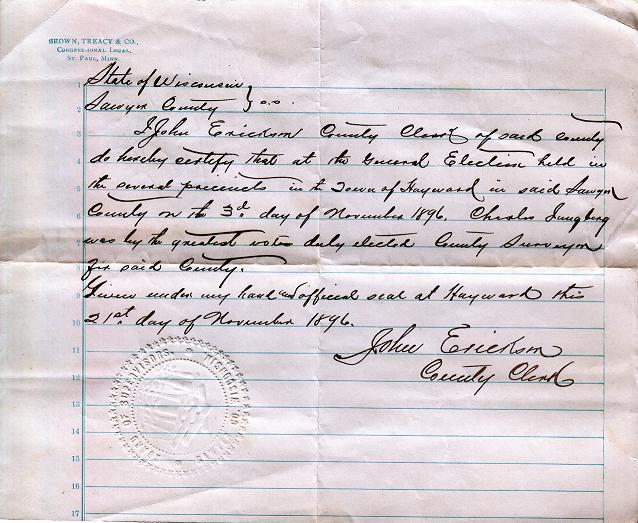The state forester
of Montana is not a man who brings to the task of looking after the enormous
timber resources of the state merely a theoretical knowledge of forestry,
for he has had experience both as a lumberman and as a lumber inspector;
has been game warden and bounty supervisor; and so knows the situation
from various standpoints. With so large a proportion of the state's are
in the national forest reserve and with the enormous inroads upon the national
supply of timber, it is of the highest importance that our foresters be
men who can intelligently carry out the policy of conservation, and who
have the will to make their knowledge practical. For this reason Mr. Jungberg
is especially adapted to the position he is now filling.
Charles T. Jungberg,
the father, was born and raised in Sweden of German parentage and came
to this country in the early forties. He caught the gold fever of the "forty-niners,"
and spent some time in the California gold camps, but he gained nothing
but experience from his operations there. He was by profession a mechanical
engineer, and settled in Chicago, where Charles, Junior, the eldest of
the four children in the family, was born on January 29, 1862. The mother
was Pauline Lawson, a native of Gottenberg, Sweden. She was born June 1,
1839, and is now a resident of Chippewa Falls, Wisconsin. Her husband has
been deceased for some twenty years.
The Jungberg family
removed from Chicago to Ithaca, New York, and here Charles attended school
until he was sixteen. His parents moved to a farm in Wisconsin and for
two years Charles followed farming, being the sole support of his mother
and younger sisters, during this period. He took up the study of civil
engineering, and in a short time was able to make this his means of livelihood.
For
three terms he was county surveyor of Sawyer County. During this time,
he was also learning the lumber business, and he worked at that when not
engaged in surveying. It was during this period that he held the office
of district game warden, and later of lumber inspector.

In 1900, Mr. Jungberg
came to Montana, locating in Kalispell, where he was superintendent of
the Summers (sic) Lumber Company. This concern is the largest in the Flathead
district, and for nine years he directed the operations of the company.
it was while holding this position that Mr. Jungberg was appointed state
forester, and he came from Kalispell to Helena in January, 1909. Ever since
1877 forestry has been a matter of study with Mr. Jungberg, and he has
had a wide practical experience in this line of work. He is rightly regarded
as an expert in forestry, and since he has been in office he has proven
his claim to such reputation by the revision of the forestry laws of the
state. These changes have been brought about by Mr. Jungberg's efforts,
and have been of the highest benefit to the cause of forestry.
Mr. Jungberg is a
member of the Modern Woodmen of America in Wisconsin, and in the same state
he maintains his affiliation with the Knights of Pythias. At Kalispell,
he belongs to the Masonic order, being a member of both the chapter and
commandery.
All the members of
Mr. Jungberg's family are natives of Wisconsin. His wife, Mary Ella Gillette,
was formerly a resident of Superior, Wisconsin, in which city her marriage
to Mr. Jungberg occurred on September 7, 1891. The two daughters, Mary
Pauline, and Una F., were both born in Hayward, Wisconsin; the former on
December 4, 1892, and the latter on April 17, 1894. The family
are members of the Methodist church.
Mr. Jungberg belongs
to the Progressive wing of the Republican party, and is naturally specially
interested in their policy of conservation of natural resources. He has
the sound judgment combined with initiative which is the fruit of a thorough
course in the school of experience. He has worked his own way in this great
university, which bestows no empty diplomas, and has received "honorable
mention" for work already done. He has by no means finished his course,
and no one who knows him doubts that he is one who will receive still higher
honors.
Extracted from "A
History of Montana" by Helen Fitzgerald Sanders, Volume III, copyright
1913, page 1622-1623
.

